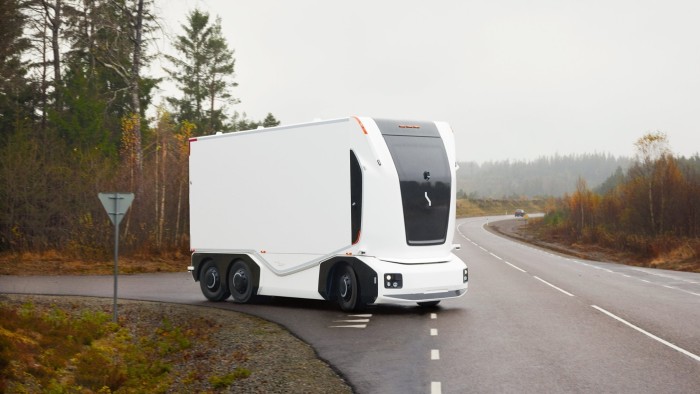Unlock the Editor’s Digest for free
Roula Khalaf, Editor of the FT, selects her favourite stories in this weekly newsletter.
Einride, a Swedish driverless truck start-up pushing to disrupt the logistics business, is preparing for a possible US stock market listing. To attract investors, it is about to turn to the hottest sector right now: defence.
The company is in talks with unnamed defence forces to provide its autonomous driving technology to transport army equipment to the frontline, according to people familiar with its plans.
Einride is the latest European company to try to exploit one of the biggest business trends on the continent in 2025 — the huge increase in defence spending. That is manifesting itself in at least two ways for companies entering the sector: either like Einride discovering their existing technology has a dual military use; or like some of the car industry from Germany and France to Italy looking to convert their production lines to defence.
“It’s such a shift. All of a sudden everybody is into defence and security,” says Mikael Karlsson, chief executive of MW Group, a Swedish defence investor.
The question is whether such a shift can help Europe as it re-arms against an increasingly assertive Russia that is already running a wartime economy in which most of its industry is geared towards defence. Do European companies have the urgency, but also the patience, to make it work?
“A lot of people think that defence spending will be a golden ship that will make all problems go away. But it needs to be for real. You have more unserious actors coming in thinking you can earn a lot of money in the next five years,” says Karlsson.
The sudden focus on defence is perhaps most noticeable in Europe’s biggest car-producing countries, dealing with both an expensive transition to electrification and weak demand.
Rheinmetall, the German defence company, has offered work in an ammunition plant to 100 workers of an unprofitable brake factory belonging to supplier Continental.
Hensoldt, another German defence company, wants to employ workers from Conti and rival car parts supplier Bosch who have been let go.
Schaeffler and Trumpf, two of the biggest Mittelstand companies that make up Germany’s industrial backbone, have said they are looking at expanding into defence. Rheinmetall is also weighing a takeover of one of Volkswagen’s soon-to-be idle plants, saying that the factory in Osnabrück would be a “good fit” and less complex than building something new. And
the Porsche-Piëch family has said it is exploring the acquisition of a defence company as part of new plans to invest up to €2bn and diversify its holdings beyond Volkswagen and luxury-car maker Porsche.
In Italy, industry minister Adolfo Urso told the Financial Times that car parts suppliers needed to diversify to survive, and defence was an obvious candidate as the US moved military assets away from Europe. “Italy is an industrial ecosystem primed for a diversification towards aerospace, underwater, shipbuilding, and also the defence industry,” he said.
Europlasma, a French industrial group, is also wanting to get in on the trend by buying La Fonderie de Bretagne, a former supplier to carmaker Renault. “The automotive industry is changing completely, the volumes of the Fonderie are shrinking dramatically, and there is no activity that can replace it so quickly as the defence industry,” chief executive Jérôme Garnache-Creuillot told French TV. He said the Fonderie had the potential to make up to 3mn artillery shells a year.
It is not hard to see why companies are contemplating such a shift. Share prices of Europe’s automotive sector are flat over the past three years, while defence stocks have more than quadrupled. But the defence sector is no panacea for Europe’s industrial woes. Moving into military gear can be a time-consuming and costly process with many permits needed.
Some prominent industrialists also question the logic of the shift. John Elkann, chair of Franco-Italian carmaker Stellantis, told the Italian parliament recently that the US and China had both strong car and defence sectors, meaning no choice needed to be made between the two. “We don’t think the future of the car is the defence industry,” he added.
Karlsson says he prefers to invest in companies that have civilian and defence applications, and switch between them depending on demand. One example is Arbonaut, a Finnish company that digitalises forests. “It is similar to pre-battlefield planning tools: how can you plan your communication lines, your logistics lines, where can you go with your vehicles, how can the enemy navigate through the area?” he asks. They are questions many more European companies will probably ask themselves in the rush to benefit from extra defence spending.
